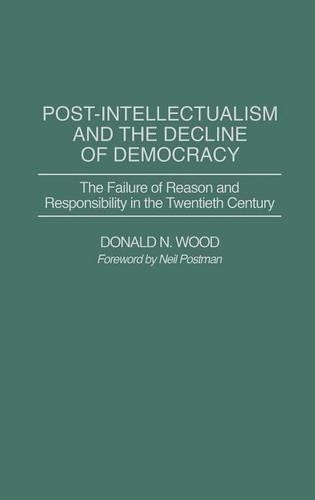
Post-Intellectualism and the Decline of Democracy: The Failure of Reason and Responsibility in the Twentieth Century
(Hardback)
Available Formats
Publishing Details
Post-Intellectualism and the Decline of Democracy: The Failure of Reason and Responsibility in the Twentieth Century
By (Author) Donald N. Wood
Bloomsbury Publishing PLC
Praeger Publishers Inc
30th August 1996
United States
Classifications
Tertiary Education
Non Fiction
321.80904
Physical Properties
Hardback
320
Description
Our society's institutional infrastructuresour democratic political system, economic structures, legal practices, and educational establishmentwere all created as intellectual outgrowths of the Enlightenment. All our cultural institutions are based on the intellectual idea that an enlightened citizenry could govern its affairs with reason and responsibility. In the late 20th century, however, we are witnessing the disintegration of much of our cultural heritage. Wood argues that this is due to our evolution into a ^Upost-intellectual society^Ra society characterized by a loss of critical thinking, the substitution of information for knowledge, mediated reality, increasing illiteracy, loss of privacy, specialization, psychological isolation, hyper-urbanization, moral anarchy, and political debilitation. These post-intellectual realities are all triggered by three underlying determinants: the failure of linear growth and expansion to sustain our economic system; the runaway information overload; and technological determinism. Wood presents a new and innovative social theory, challenging readers to analyze all our post-intellectual cultural malaise in terms of these three fundamental determinants.
Reviews
"Professor Wood's book is about the kind of morality that democracy stands for, how it came to be, what the dangers are to it, and how we might proceed to preserve it. To accomplish such a task, one must have a deep understanding of history as well as a keen sense of contemporary social, technological, and political trends. This is exactly the sort of knowledge Professor Wood posseses, and there is no other phrase for what he has accomplished than tour-de-force."-from the foreword by Neil Postman Chair of the Department of Culture and Communication New York University
Provocative social-cultural theory; jeremiad; prophecy of an already arrived technocratic dystopia. This book by a senior media scholar is all these. The human condition has evolved from a cyclical oral tradition to a linear culture of written intellectualism, but events of the last 35 years indicate descent into a Web culture of postintellectualism in which electronic media are central. Wood sees postintellectualism as the fruit of deliberate counterintellectualism and distended intellectualism, the 'irresponsible, unbridled, linear extension of intellectual endeavors without consideration of ultimate consequences'....much of what he writes is important, compelling, irrefutable. Recommended for academic readers, entering students through faculty.-Choice
"Provocative social-cultural theory; jeremiad; prophecy of an already arrived technocratic dystopia. This book by a senior media scholar is all these. The human condition has evolved from a cyclical oral tradition to a linear culture of written intellectualism, but events of the last 35 years indicate descent into a Web culture of postintellectualism in which electronic media are central. Wood sees postintellectualism as the fruit of deliberate counterintellectualism and distended intellectualism, the 'irresponsible, unbridled, linear extension of intellectual endeavors without consideration of ultimate consequences'....much of what he writes is important, compelling, irrefutable. Recommended for academic readers, entering students through faculty."-Choice
Author Bio
DONALD N. WOOD is Professor of Radio-Television-Film at California State University, Northridge. He is author of Educational Telecommunications (1977), Mass Media and the Individual (1983), Designing the Effective Message (1989), and co-author of Television Productions: Disciplines and Techniques (1978, and Sixth ed. 1995).
